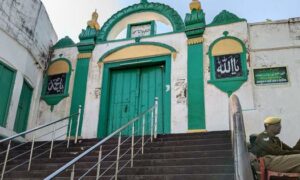
Daddy worked many jobs, but Daddy liked his night job best. He liked shooting stray dogs in the streets.
Every morning he swept the roads, painted dull pavements, and unclogged jammed gutters in Victoria Colony, and every evening he slung the shotgun over his shoulder, left the servant quarters, and went into the dimming alleys looking for dogs. He told me it was okay to hunt them down because they were feral. Borderline mad. They were no one’s anything. They had no mothers. No one wailed for them after they were gone. They were stray, and stray things did not carry a soul.
When November arrived, I dropped out of school and began accompanying my father to work. My mother was furious. She had been dreaming of a better future for me. One where I had a proper job. She did not want me raking leaves in a rich man’s red-brick bungalow or playing cricket in the garden with his son, who only spoke in English – she envisioned better lives, lives that required schooling. Perhaps I could have been a well-dressed clerk at a government office, or an IT specialist at an English medium school like my mother’s younger brother, Aslam. He had taken a computer training course after his BA exams.
“I don’t shop at the landa bazaar now,” Aslam had said on his last visit to our servant quarter. We were sitting on charpoys in the small open courtyard drinking chai. I noticed he was wearing a green and white plaid dress shirt.
Aslam Mamu was a big man now. “I shop at the mall. Never the flea market again.”
Amma liked her brother’s new extravagance. She watched him prosper – with fascination. It was something she had never been granted growing up – a chance to leap, make mistakes, fix them and leap again. A chance to find herself and find out what she was good at besides squatting and sweating profusely before a gas stove, making parathas and aloo methi or chana and white rice. Amma had many resentments.
Mother was married off at fifteen to her distant cousin, my father, who lived in the same village in Hafizabad. Neither had attended school. Mother was a liability, and she would say that liabilities in her family were not sent to schools or colleges, but bundled up and wedded off to cousins who worked or old widowers who needed young brides to make them dinner and tend to their ailing bodies.
Daddy told me he left school when he was seven because he didn’t like his strict math teacher who hit students’ palms with a wooden ruler when they got the multiplication tables wrong. Daddy dashed back home one day, leaving behind his satchel and lunchbox on the school bench. From then on, it was lifting wheat sacks at a warehouse with his older brothers.
Mother had shoved Daddy out of the village to Lahore for a better life after they married. She had my sister, Rashda, at sixteen, lost five children after that (one died during birth, two strangled themselves in the womb, and two frail twins survived only a year), and then had me, a boy. A miracle child. Mother would say she had me after visiting various shrines, wearing multiple amulets, and falling at the feet of many colourful saints.
“Mera beta,” Amma would sing. “My beautiful little son. It was the big pir’s prayer that blessed me with you, Haider Ali. Don’t become a useless and soulless man like your father. Learn from your Aslam Mamu.”
Daddy never cared for my uncle’s new lifestyle, and didn’t like when he visited. Daddy did not like his leather belts and shoes. He didn’t like his ironed dress shirts, the rented two-room house, or his new wife, who always wore bright pink lipstick.
Once, Daddy and I watched Aslam Mamu speed away on his Honda CD70 motorbike after he had finished telling us about his shopping mall trips. Daddy had furrowed his eyebrows and spat his paan in the open alley sewer outside the quarter. The servant quarters were lined with tin doors, red spit stains and cigarette butts.
“Sister-fucker,” Daddy muttered in Punjabi.
If my uncle was a successful man, my father was a proud one.
I did not know who I wanted to be at the age of ten.
I did not know if I wanted to be like Aslam Mamu, whizzing and zooming through Lahore on my gleaming Honda, or to be like Daddy, with a pack of Morven cigarettes, ambling through colonial bungalows with jasmine vines and Rangoon creepers on walls, holding a broom for sweeping or a thick bamboo stick for blocked drains and gutters.
What I did know was that I wanted a life somewhat similar to that of the little boy in Bungalow 17.
He was seven.
He had a blue bicycle which he rode around the circular driveway of the colonial house, went to school in a huge black car with a green government number plate, and called his father “Daddy.” After I heard him sing “Daddy, Daddy, Daddy” in the corridors of the bungalow and the driveway, I began to call my father that too.
My father had taken me to Bungalow 17 several times. He was a part-time worker there. He washed the driveway, helped the gardener trim the hedges, and had lunch in the kitchen with the driver, Samandar Khan.
The mistress needed extra help around the house and was looking for an errand boy, so my father took me there one day and offered my services. The mistress stood on the porch wrapped up in a black shawl with red embroidered flowers and looked down at me. She asked why I wasn’t at school.
“How can a poor man like myself pay for two kids’ school?” my father began. “And he says he doesn’t want to go to school either.”
“The driver said you have an older daughter too,” she said. ‘Does she go to school?”
“Yes, madam. She’s sixteen. She’s sitting for her matriculation exams in May.”
“I can pay for the boy’s expenses if he goes to school,” the mistress offered, looking down at me. I could tell from her face that she was impressed by my sister and a little disappointed in me.
Jealousy stirred in me. I felt about Rashda what my father felt about my uncle.
“Speak, boy,” Daddy nudged me jokingly. “Would you go to school if Madam pays?”
“I’d go to school if I could go in a big car like that” – I pointed at the black Land Cruiser Samandar Khan was cleaning.
Daddy smacked my head. The mistress chuckled and went into the bungalow through the screen door.
She had said I was hired.
Excerpted with permission from ‘Stray Things Do Not Carry A Soul’ in What Remains After a Fire: Stories, Kanza Javed, HarperCollins India.
📰 Crime Today News is proudly sponsored by DRYFRUIT & CO – A Brand by eFabby Global LLC
Design & Developed by Yes Mom Hosting






